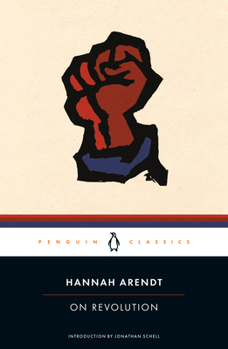On Revolution
Select Format
Select Condition 
Book Overview
A unique and fascinating look at violent political change by one of the most profound thinkers of the twentieth century and the author of Eichmann in Jerusalem and The Origins of Totalitarianism Hannah Arendt's penetrating observations on the modern world, based on a profound knowledge of the past, have been fundamental to our understanding of our political landscape. On Revolution is her classic exploration of a phenomenon that has reshaped the globe. From the eighteenth-century rebellions in America and France to the explosive changes of the twentieth century, Arendt traces the changing face of revolution and its relationship to war while underscoring the crucial role such events will play in the future. Illuminating and prescient, this timeless work will fascinate anyone who seeks to decipher the forces that shape our tumultuous age.
Format:Paperback
Language:English
ISBN:0143039903
ISBN13:9780143039907
Release Date:September 2006
Publisher:Penguin Classics
Length:368 Pages
Weight:0.62 lbs.
Dimensions:0.6" x 5.1" x 7.7"
Age Range:18 years and up
Grade Range:Postsecondary and higher
Customer Reviews
4 ratings
Dense but well worth the effort
Published by Thriftbooks.com User , 15 years ago
On Revolution is a philosphical examination of revolution which focuses on the U.S. and French revolutions of the 18th century as the model. What surprised me in this work was just how little Arendt focused on the U.S. revolution, and her conclusion that the U.S. example was not a pure example of a revolution as the French version. As it stood I understand her reasoning but I was still somewhat taken aback. Her examination of the currents that propelled both events forward was enlightening, and showed the stark contrasts between the two events. It was a fascinating exploration to see the areas of similarities along with the aspects of difference, and the author's ability to set forth the social aspects which were the main departures for both revolutions really went a long way in furthering my understanding of both events. This book is a vital piece to understanding these revolutions. This philospohical examination has greatly enriched my understanding of these historical events along with giving me a greater appreciation for the differences between actual revolutions and rebellions and other revolts. The author's discussion and distinguishing between power, authority and violence gives the reader a greater understanding of the relationship between these three, and shows how each relate to the political sphere. This author's erudition is invaluable, and her take on these phenomena will further anyones understanding of revolutions. Of course the reader should be prepared for a dense work that requires some base knowledge from the reader. The book is not a lazy weekend read, but is instead a work that requires full attention. This book will reward those who do put forth the effort though. It is an amazing book that should be read.
_
Published by Thriftbooks.com User , 16 years ago
This Arendt's classical work speaks for itself. It's a fundamental book for any studious of the processes linked to any structural rupture on the basis of organized societies.
On "On Revolution"
Published by Thriftbooks.com User , 18 years ago
On Revolution by Hannah Arendt is a philosophical study of the nature of revolutions, mainly focusing on the French and American revolutions. A big portion of her analysis involves the "Social Question" involved in revolutions. How do revolutions start? Even though her writing style can be convoluted and overly verbose at times, eventually the reader will acclimate to her not so accessible prose. This is not a light read. If you want a book to stimulate internal dialogue, however, this is the book to buy.
Brilliant
Published by Thriftbooks.com User , 25 years ago
This book is yet another deep, original and controversial contribution of Hannah Arendt to twentieth century political theory. In this book, Arendt analyzes the phenomenon of revolution by focusing almost exclusively on the great XVIIIth century revolutions, the American and the French. Arendt's deep insights allow her to compare, both on a theoretical and a practical level, the similarities and differences between the two and on how and why the American Revolution allowed the foundation of freedom while the French failed miserably in this attempt almost from the beginning. The great themes in this book are the social question (necessity) in its relation to politics (the realm of freedom) and the ever-present distinction between liberation and freedom properly speaking. Thus, constitutions and their significance, the problem of secular law in relation to its need for an Absolute with which to provide a foundation for it, the problem of hypocrisy and Robespierre's Terror, and insightful interpretations of some of the Founding Fathers' political thought (though in my opinion a bit too far reaching in her inferences thereof), are all issues with which she deals with in this book and which are rounded up in a great closing chapter. Deep, powerful, perceptive, intense: like most of Arendt's writings, a must read for anyone interested in political thought and theory.






